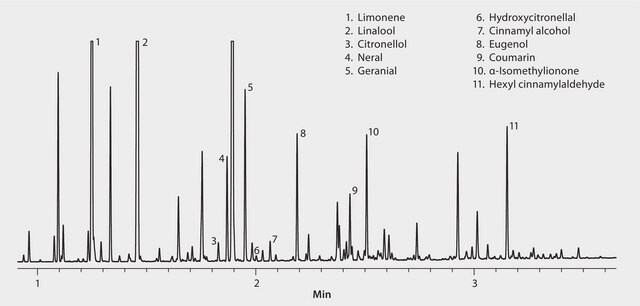28482-U
SLB®-5ms GC-Kapillarsäule
L × I.D. 30 m × 0.32 mm, df 0.25 μm
About This Item
Empfohlene Produkte
Materialien
fused silica
Agentur
Standard Method 6040D
EN 2005/108/EC
EPA 610,625,8015,8082,8100,8141,8270,OLM04.2 SVOA
EPA TO-13,IP-8,8270,525.2,608.1/608.2,608/8081/OLM04.2 PEST
JMHLW
NIOSH 2530,5503
OSHA 62
meets requirements for USP G27 and G36
suitable for EPA 1613
Einhaltung gesetzlicher Vorschriften
FDA LIB 4423
Parameter
-60-340 °C temperature (isothermal)
-60-360 °C temperature (programmed)
Beta-Wert
320
df
0.25 μm
Methode(n)
GC/MS: suitable
gas chromatography (GC): suitable
L × ID
30 m × 0.32 mm
Aktive Matrixgruppe
Bonded and highly crosslinked; silphenylene polymer virtually equivalent in polarity to poly(5% diphenyl/95% dimethyl siloxane) phase
Anwendung(en)
agriculture
chemicals and industrial polymers
cleaning products
clinical
cosmetics
environmental
flavors and fragrances
food and beverages
forensics and toxicology
industrial hygiene
life science and biopharma
personal care
petroleum
pharmaceutical (small molecule)
Säulenart
capillary non-polar
Suchen Sie nach ähnlichen Produkten? Aufrufen Leitfaden zum Produktvergleich
Allgemeine Beschreibung
USP-Code: Diese Säule erfüllt die Anforderungen von USP G27 und G36.
Phase:
- Gebunden und hoch vernetzt
- Das Silphenylen-Polymer ist hinsichtlich seiner Polarität nahezu äquivalent zu Poly(5%-Diphenyl/95%-Dimethylsiloxan)
- ≤0,32 mm ID: -60 °C bis 340 °C (isotherm) oder 360 °C (programmiert)
- ≥0,53 mm ID: -60 °C bis 330 °C (isotherm) oder 340 °C (programmiert)
Sonstige Hinweise
Rechtliche Hinweise
Choose from one of the most recent versions:
Besitzen Sie dieses Produkt bereits?
In der Dokumentenbibliothek finden Sie die Dokumentation zu den Produkten, die Sie kürzlich erworben haben.
Artikel
Sigma-Aldrich presents an article about the analysis of melamine and related compounds in dog food with the use of more economical gas chromatography-mass spectrometry (GC-MS) instrumentation.
Verwandter Inhalt
This page is intended to make it easier to find the consumables you need based on the analytical method you’re using. Methods included on this page come from the EPA, Standard Methods and ASTM.
Unser Team von Wissenschaftlern verfügt über Erfahrung in allen Forschungsbereichen einschließlich Life Science, Materialwissenschaften, chemischer Synthese, Chromatographie, Analytik und vielen mehr..
Setzen Sie sich mit dem technischen Dienst in Verbindung.




